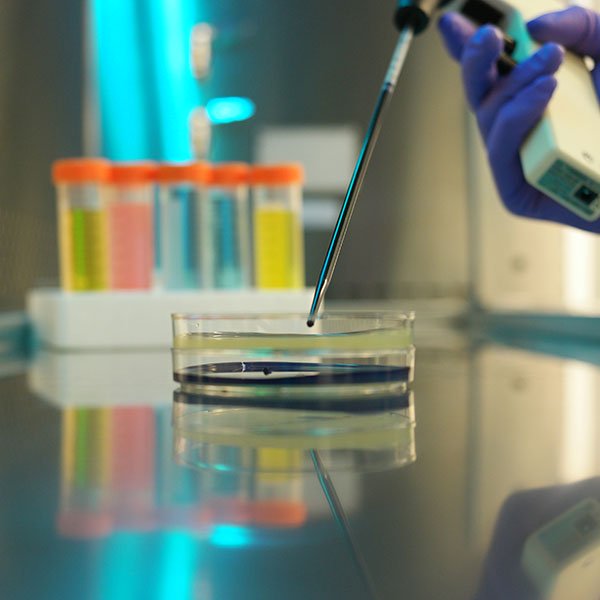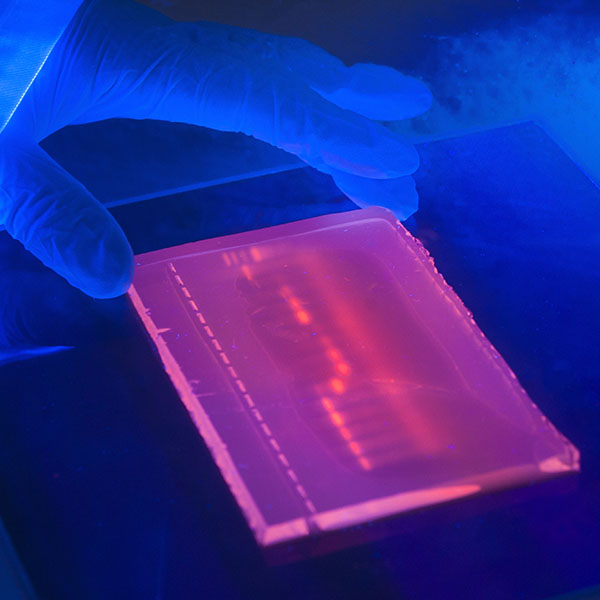| Name |
Research methodologies & approaches used |
Current PhD student topics |
| Dr Joshua Barham |
- organic synthesis
- radical chemistry
- electrochemical synthesis
- photochemical synthesis
|
- synthetic photoelectrochemistry
- continuous flow chemistry design and optimization
- molecular transformation of persistent pollutants biomass derived molecules into useful synthetic building blocks
|
| Dr Rebecca Beveridge |
- ion-mobility mass spectrometry
- protein structure and dynamics
- biomolecular interactions
|
- development of mass spectroscopy methods to study proteins and protein complexes
- investigate challenging systems such as intrinsically disordered proteins and complex binding modes
|
| Professor Glenn Burley |
- synthesis
- bioconjugation
- gene expression
- nucleic acid chemical biology
- chemistry of nucleosides
|
- design and synthesis of antibody-drug conjugates and nucleoside analogues
- bioorthogonal labelling strategies
- biosensor development
- Molecular therapeutics
|
| Dr Shiao Chow |
- catalysis
- organic synthesis
- bioorthogonal chemistry
- medicinal chemistry
|
- development of advanced bioorthogonal catalysts
- perform advanced biological interrogation in living systems
- smarter diagnostic tools for early disease detection and prevention
|
| Professor Peter Cormack |
- design, synthesis and characterisation of organic polymers
- macromolecular chemistry
- polymer microspheres
- molecular recognition
- separation science
|
- synthesis and use of functional organic and macromolecular materials
- development and exploitation of molecularly imprinted polymers
- microporous solids
- branched polymers and self-assembling systems
|
| Professor Damion Corrigan |
- electrochemical biosensors (nucleic acid
- immunoassays and small molecule detection)
- bioelectrochemistry
- DNA origami
- surface attachment and bioconjugation
- sensor and device fabrication
|
- low-cost electrode systems
- electrochemical immunoassays
- nucleic acid amplification
- lab-on-a-chip technologies
- molecular and medical diagnostics
|
| Dr Gavin Craig |
- porous molecules and composite materials
- structural chemistry
- crystallisation
- supramolecular chemistry
|
- metal-organic cages for gas storage
- cooperative gas uptake
- sustainable synthesis of porous materials
|
| Dr Christine Davidson |
- experimental research
- quantitative analysis
- method development
- environmental studies
|
- development of colorimetric sensors for field applications
- geochemistry of potentially toxic elements in freshwater systems
- sequential chemical extraction; microplastics as vectors for potentially toxic elements in the environment
- phytoremediation of contaminated soil
|
| Dr Lynn Dennany |
- electrochemical analysis
- cyclic voltammetry
- electrochemiluminescence
- chromatography
- spectroscopic analysis
|
- illicit drug detection
- biomarker recognition
- bacterial infection detection
- portable drug screening
- pharmaceutical drug detection
- combined electrochemical & spectroscopic analysis
|
| Dr Robert Edkins |
- synthesis of organic and inorganic conjugated molecules
- (time-resolved) fluorescence spectroscopy
- fluorescence microscopy
|
- photodynamic and photothermal therapy
- fluorescent sensors
- photoactive materials
|
| Professor Karen Faulds |
- Raman
- Surface enhanced Raman scattering (SERS)
- Bionanotechnology
|
- surface enhanced Raman scattering bionanosensors for bioanalytical detection (for example for cancer, bacteria, sepsis, cardiovascular disease)
- biomedical spectroscopy
- nanoparticle synthesis and biofunctionalisation, towards in vivo detection of nanobiosensors (SESORS)
- Raman/surface enhanced Raman scattering imaging
|
| Dr Ying Fu |
- organic bioelectronics
- organic electrochemical transistors
- biomarker detection
|
- highly sensitive organic bioelectronics
- low-cost point-of-care device
- early medical diagnosis
|
| Professor Duncan Graham |
- nanoparticle synthesis and modification
- Raman spectroscopy including surface rnhanced Raman scattering and stimulated Raman scattering
- Raman microscopy and cellular imaging
|
- sensors for biomolecules relating to disease including DNA, RNA, proteins
- new imaging approaches and chemical probes for cellular analysis relating to diseases including metabolic disease, cancer and liver injury
|
| Dr Penelope Haddrill |
- molecular biology
- DNA profiling
- RNA quantification
- population genetics and genomics
|
- analysis of DNA methylation to estimate age
- RNA quantification for ageing body fluid stains
- population genetics and genomics of global human populations
|
| Professor Clare Hoskins |
- nanomedicine
- cancer nanomedicine
- therapeutics
- diagnostics, theranostics
- polymer synthesis
- inorganic synthesis
- formulation
- in vitro testing
|
- nanomedicine development for cancer therapeutics
- theranostic development for earlier detection and treatment in cancer
- drug formulation for bioavailability enhancement
- targeted drug delivery systems
- stimuli-responsive drug delivery systems
|
| Dr Aruna Ivaturi |
- thin films
- solar cells
- optoelectronics
- photovoltaics
|
- perovskite solar cells
- biosorbants and photocatalysts
- energy storage and supercapacitors
- sustainable energy materials
- environmental remediation
|
| Dr Craig Jamieson |
- medicinal chemistry
- organic synthesis
- peptide chemistry
- chemical biology
|
- design, synthesis and evaluation of bioactive compounds
- sustainable approaches to amidation chemistry
- novel biomolecular labelling techniques
|
| Dr Alan Kennedy |
- X-ray diffraction
- crystallography
- structural analysis
- solid-state analysis
|
- pharmaceutical materials
- dyes and pigments
- correlation of solid-state structures with material properties
- solubility
|
| Professor William Kerr |
- metal-mediated synthetic organic chemistry
|
- hydrogen isotope exchange
- C-H activation
- natural product synthesis
- asymmetric processes
|
| Dr K H Aaron Lau |
- control of peptide and peptide-mimetic (peptoid)
- material properties through sequence design of molecules
- solid phase synthesis of peptide and peptoids
- Nanostructure self-assembly (nanosheets, micelles, nanofibres)
- enzyme triggered self-assembly
- protein separation using nanopores
- HPLC
- LC-MS
- MALDI-MS
- anodisation
- surface plasmon resonance (SPR)
- ellipsometry and related surface optical measurements
- AFM
- XPS
- SEM
|
- biointerfaces
- (stem) cell-surface and protein-surface interactions
- transport/diffusion of proteins through nanopores
- antifouling and antimicrobial polymer brushes and nanostructures
- polyphenol surface modification
- protein and enzyme assays
- peptide characterisation
|
| Dr John Liggat |
- polymer physical chemistry
- physics and technology
- including adhesion
- crystallisation behaviour
- physical ageing
- nanocomposite technology and polymer processing
- elucidation of the mechanistic organic chemistry of polymer degradation processes, particularly in relationship to polymer durability
- processing and fire response
|
- physical chemistry of gelatin
- fire-retardant polyurethanes
- polymer photochemistry
- self-healing coatings
- fermentation-derived biodegradable polymers
- composite materials
|
| Dr David Lindsay |
- synthetic organic chemistry
- organometallic chemistry
- catalysis
- computational chemistry
- physical organic chemistry
|
- new methods for C-C, C-N and C-O bond formation
- computationally-guided catalyst design for C-C bond formation
|
| Dr Lewis MacKenzie |
- inorganic synthesis
- solvothermal nanoparticle synthesis
- powder X-ray diffraction
- upconversion luminescence spectroscopy
- UV-VIS spectroscopy
- electron microscopy
- zeta-potential analysis
- dynamic light scattering analysis
|
- development of non-invasive trans-tissue biosensors based upon upconversion nanoparticles
|
| Professor Robert Mulvey |
- main group chemistry
- organometallic chemistry
- structure and bonding
- synthesis
- catalysis
|
- synergistic chemistry using bimetallics
- sustainable homogeneous catalysis though earth abundant metals
- trans-metal trapping
|
| Professor John Murphy |
- synthetic organic chemistry
- chemical mechanism
- physical organic chemistry
|
- electron transfer in chemistry and biology
- radical ions
- super electron donors
- super electrophiles
- C-H activation
|
| Dr David Nelson |
- physical (in)organic chemistry
- catalysis
- organometallic chemistry
- organic synthesis
|
- reaction mechanisms and structure/reactivity relationships in nickel catalysis
- odd-numbered oxidation states of nickel in catalysis
|
| Dr Tahereh Nematiaram |
- theoretical and computational chemistry
- developing physical models
- data-driven materials discovery
- materials design strategies
|
- computational discovery of functional molecules and materials
- charge transport properties of molecular semiconductors
- optical properties of molecules and solids
|
| Dr Alison Nordon |
- process analysis
- chemometrics
- in situ measurements
- optical spectroscopy
- acoustics
- NMR spectroscopy
|
- in situ monitoring of continuous pharmaceutical manufacturing processes
- advances in chemometrics for on-line mid infrared and low-field NMR measurements
- advances in data pre-processing, compression and data fusion for assessment of tea products by hyperspectral imaging
- advances in data pre-processing, compression and data fusion for assessment of tea products by hyperspectral imaging
- process performance monitoring for the life sciences
|
| Dr Charles O'Hara |
- synthesis
- catalysis
- structural elucidation
|
- main group catalytic applications
- novel methodologies for the deprotonation of arenes
- bimetallic asymmetric synthesis
|
| Dr David Palmer |
- theoretical and computational chemistry
- molecular informatics
- molecular simulation
- quantum mechanics
- artificial intelligence
- machine learning
- statistical mechanics
- solution-state theory
|
- molecular integral equation theory in drug discovery
- protein allostery
- chymosin biochemistry
- artificial intelligence for molecular property prediction
|
| Dr John Parkinson |
- applications using and developments of nuclear magnetic resonance (NMR) spectroscopy methods
|
- complex mixture analysis
- metabolic profiling
- reaction process monitoring
- artificial intelligence in NMR
- photo-active process monitoring
- biomolecular structure elucidation
- molecular recognition and related molecular assembly processes
- venom chemistry
|
| Dr Binoy Paulose |
- single molecule detection
- single cell biopsy
- dielectrophoresis
- micro/nanofabrication
- nanopore sensing
- scanning electrochemical probe microscopy
|
- amplification free detection of disease biomarkers
- development of single cell biopsy platform to map dynamic transcriptional changes
- dielectrophoretic nanotweezers
|
| Dr Marc Reid |
- computer vision
- reaction monitoring
- kinetic analysis
- machine learning
- high throughput experimentation
|
- software development for camera-based reaction monitoring
- enhanced forensics tests with imaging technology
- understanding mixing effects in catalytic hydrogenation processes
- developing reactivity scales with computer vision
- catalyst degradation analysis
- robotics for high throughput kinetic imaging analysis
|
| Dr Stuart Robertson |
- inert atmosphere synthesis
- solid state and solution structure elucidation
- organometallic complex design
|
- secondary magnesium battery electrolyte design and synthesis
- bimetallic main group chemistry
|
| Dr Fraser Scott |
- medicinal chemistry
- synthetic organic chemistry
- biophysical measurements
- antimicrobial susceptibility testing
- enzyme inhibition assays
|
- design, synthesis and evaluation of novel anti-infective agents
- design, synthesis and evaluation of novel anticancer agents
- mechanism of action studies of minor groove binder drugs
|
| Dr Sebastian Sprick |
- porous polymers
- conjugated polymers
- light-driven reactions; photocatalysis
|
- sustainability
- solar fuels generation
- hydrogen generation
- water splitting
- water purification
|
|
Dr Juliane Simmchen
|
- colloidal synthesis and characterisation
- microscopy
- biohybrids
|
- active matter
- micro plastic
- colloidal computation
|
| Professor Nicholas Tomkinson |
- synthesis
- isolation
- purification and analysis of small organic molecules
|
- chemical biology
- medicinal chemistry
- synthetic methodology
|
| Professor Christopher Tuttle |
- development and application of computational methods including
- density functional theory
- atomistic molecular dynamics (MD) simulations
- coarse grain methodology
- multi scale methods
|
- directed discovery of functional peptide-based materials
- catalyst design
- rationalising reactivity
- exploiting experimental and computational chemistry synergy.
|
| Dr Alastair Wark |
- bioanalytical chemistry
- nanotechnology
- optical (Raman, fluorescence, surface plasmon resonance) and electrochemical sensors
- confocal multiphoton microscopy including coherent Raman techniques
- cell imaging
- surface and interfacial chemistry
|
- biomolecular and environmental sensor design
- disease detection
- multiplexed biomarker panel analysis
- nanoparticle synthesis and functionalisation
- single nanoparticle tracking
- multi-modal optical imaging and monitoring live cells
|
| Dr Catherine Weetman |
- inert atmosphere synthesis
- organometallics, nuclear magnetic resonance (NMR) studies
- density functional theory (DFT) bonding analysis
- structure-reactivity relationships
|
- low-oxidation state chemistry
- main group chemistry
- main group metal-metal bonds
- main group catalysis
|








